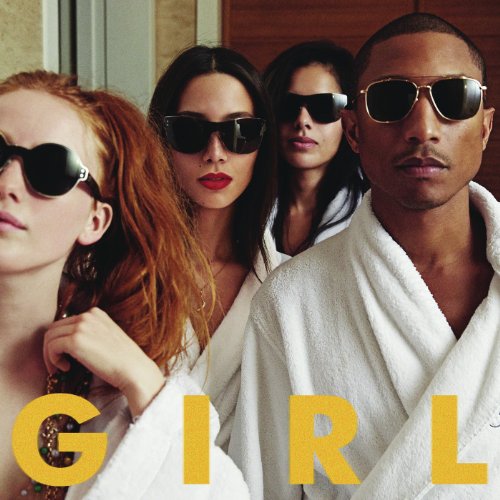There is little question that Pharrell Williams was a dominating force in 2013, with feature credit on big hits from Daft Punk and Robin Thicke and production work for a wide array of artists including Beyoncé, Jay Z, John Legend, Miley Cyrus, Aloe Blacc, and Mayer Hawthorne. By signing to Columbia Records late in the year before a chart-topping promotional push for “Happy,” originally included in the Despicable Me 2 soundtrack among several other Pharrell productions, his continued reign into 2014 has become as secured as the hat usually adorning his head.
G I R L, Pharrell’s sophomore solo album following 2006’s In My Mind, comes primarily packed with smooth R&B grooves that pair Pharrell’s easygoing falsetto with rhythmic bass lines, catchy guitar riffs, and a dash of hand-clapping. This recalls the sound of Justin Timberlake’s similarly-hyped The 20/20 Experience, but with the ego and track lengths reigned in, the album doesn’t lose itself in its pretension. Violin melodies are used sparingly to good effect: a brief rising line introduces the album before Pharrell’s utterance of the word “different” interrupts and cues a heavier beat in “Marilyn Monroe;” sweeping lines work well as a representation of the titular “Gust of Wind.” Background vocalizations, indiscernible vocal loops, and hand-claps are also placed in moderation, providing a bouncy and buoyant underbelly to tracks like “Brand New” and “Come Get It Bae,” which feature Justin Timberlake and Miley Cyrus respectively and sound in tune with each artist’s latest albums. More unusual sounds come in the percussive African influence of “Lost Queen” and the Stevie Wonder-recalling, Caribbean vibe of “Know Who You Are,” adding a splash of variety and intrigue that almost makes the simple-yet-euphoric production of “Happy” feel too lightweight by comparison.
More intriguing still are some of the melodic choices throughout the record. Album opener “Marilyn Monroe” goes from sixths in the prechorus to building from the tonic in the chorus before ending on the supertonic, showing that Pharrell is as “different” from his fellow contemporaries as his girl is from the norm. Additionally, while Daft Punk’s vocals in the chorus are fairly traditional, Pharrell eschews the tonic in the verses in favor of dominant and minor sevenths; the atypical harmonies on the prechorus to album closer “It Girl” provide another compositional treat. On occasion, the falsetto deliveries seem to veer sharp of the intended note, ranging from seemingly unintentional (Timberlake’s entrance in “Brand New”) to deliberately humorous (as Pharrell gasps “you’re leaving me … you can’t be serious!” in “Hunter”).
Romance is a main theme of the album, but it seems as if Pharrell learned from the blowback from last year’s controversial hit “Blurred Lines,” opting to be more gentlemanly. Even on “Gush,” easily the album’s most sexually explicit offering, he questions his urges, noting “my mama didn’t raise me that way” before informing his partner after mentioning how he could treat her well: “I don’t want to mislead you: tonight I think I wanna get dirty, girl,” almost as if asking for permission — a welcome change from the lack of agency given to women in many recent pop hits. Pharrell also follows suit from Kanye West’s “Bound 2” video, sprinkling lighthearted motorcycle metaphors in “Come Get It Bae” and “Lost Queen.” However, much of G I R L feels more upbeat and celebratory of women than aggressive and flirtatious. In “Marilyn Monroe,” she, Cleopatra, and Joan of Arc fail to compare to Pharrell’s desired partner; in “Lost Queen,” his love is placed as otherworldly as the only explanation for her perfection before evolving into hidden track “Freq,” in which Pharrell and JoJo praise uniqueness and self-love (and potentially provide a theme song to his collective side project, i am OTHER). Most importantly, Alicia Keys duet “Know Who You Are” champions feminism and self-esteem, as Keys even calls for a pledge to “do what I need ’til every woman on the Earth is free.”
While little seems to echo the hitmaking potential of “Happy,” the material stands well as its own body of work, and Pharrell’s accomplished name alone will likely elevate multiple singles to hit potential, especially as the weather begins to more closely reflect the upbeat melodies on the album. Nevertheless, G I R L displays Pharrell’s knack for catchy melodies and instrumental grooves while putting his own name at center billing, and it will likely continue to cement his place in the pop environment for a long time to come.

You tell em, Kurt!